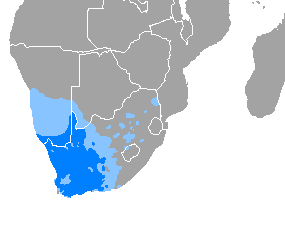
Afrikaans is a West Germanic language that evolved in the Dutch Cape Colony from the Dutch vernacular of Holland proper used by Dutch, French, and German settlers and people enslaved by them. Afrikaans gradually began to develop distinguishing characteristics during the course of the 18th century. Now spoken in South Africa, Namibia and Botswana, Zambia and Zimbabwe, estimates c. 2010 of the total number of Afrikaans speakers range between 15 and 23 million. Most linguists consider Afrikaans to be a partly creole language.
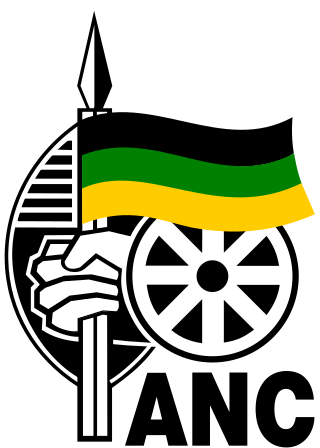
The African National Congress (ANC) is a social-democratic political party in South Africa. A liberation movement known for its opposition to apartheid, it has governed the country since 1994, when the first post-apartheid election installed Nelson Mandela as President of South Africa. Cyril Ramaphosa, the incumbent national President, has served as President of the ANC since 18 December 2017.

Cape Town is the legislative capital of South Africa. It is the country's oldest city and the seat of the Parliament of South Africa. It is the country's second-largest city, after Johannesburg, and the largest in the Western Cape. The city is part of the City of Cape Town metropolitan municipality.

Namibia, officially the Republic of Namibia, is a country in Southern Africa. Its western border is the Atlantic Ocean. It shares land borders with Zambia and Angola to the north, Botswana to the east and South Africa to the south and east. Although it does not border Zimbabwe, less than 200 metres of the Botswanan right bank of the Zambezi River separates the two countries. Namibia gained independence from South Africa on 21 March 1990, following the Namibian War of Independence. Its capital and largest city is Windhoek. Namibia is a member state of the United Nations (UN), the Southern African Development Community (SADC), the African Union (AU) and the Commonwealth of Nations.

Pretoria is South Africa's administrative capital, serving as the seat of the executive branch of government, and as the host to all foreign embassies to South Africa.

The Rugby World Cup is a men's rugby union tournament contested every four years between the top international teams. The tournament is administered by World Rugby, the sport's international governing body. The winners are awarded the Webb Ellis Cup, named after William Webb Ellis who, according to a popular legend, invented rugby by picking up the ball during a football game.

The Union of South Africa was the historical predecessor to the present-day Republic of South Africa. It came into existence on 31 May 1910 with the unification of the Cape, Natal, Transvaal, and Orange River colonies. It included the territories that were formerly a part of the South African Republic and the Orange Free State.
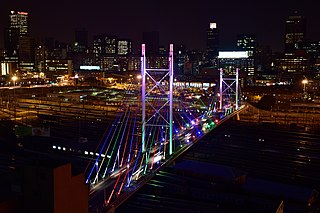
Johannesburg is the most populous city in South Africa, classified as a megacity; it is one of the 100 largest urban areas in the world. According to Demographia, the Johannesburg–Pretoria urban area is the 26th-largest in the world in terms of population, with 14,167,000 inhabitants. It is the provincial capital and largest city of Gauteng, which is the wealthiest province in South Africa. Johannesburg is the seat of the Constitutional Court, the highest court in South Africa. Most of the major South African companies and banks have their head offices in Johannesburg. The city is located within the mineral-rich Witwatersrand hills, the epicentre of the international-scale mineral, gold and (specifically) diamond trade.
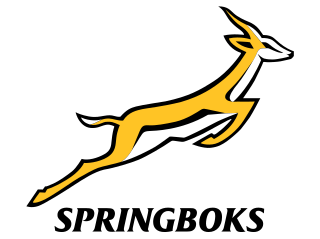
The South Africa national rugby union team, commonly known as the Springboks, is the country's national team governed by the South African Rugby Union. The Springboks play in green and gold jerseys with white shorts. Their emblem is a native antelope, the Springbok, which is the national animal of South Africa. The team has been representing South Africa in international rugby union since 30 July 1891, when they played their first test match against a British Isles touring team. They are currently the reigning World Champions and have won the World Cup on three occasions,. The Springboks are equalled with the All Blacks with three World Cup wins.

Prince Mangosuthu Gatsha Buthelezi was a South African politician and Zulu prince who served as the traditional prime minister to the Zulu royal family from 1954 until his death in 2023. He was appointed to this post by King Bhekuzulu, a son of King Solomon, who was a brother to Buthelezi's mother, Princess Magogo. Buthelezi was chief minister of the KwaZulu bantustan during apartheid and founded the Inkatha Freedom Party (IFP) in 1975, leading it until 2019, becoming its president emeritus soon after that. He was a political leader during Nelson Mandela's incarceration (1964–1990) and continued to be so in the post-apartheid era, when he was appointed by Mandela as Minister of Home Affairs, serving from 1994 to 2004.
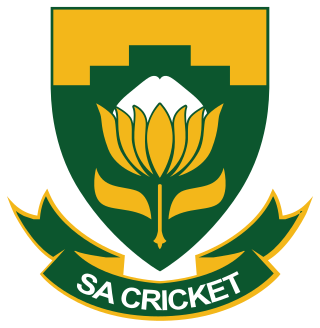
The South Africa men's national cricket team, also known as the Proteas, represent South Africa in men's international cricket and is administered by Cricket South Africa (CSA). South Africa is a full member of the International Cricket Council (ICC), Its nickname derives from South Africa's national flower, Protea cynaroides, commonly known as the "King Protea".

The South Africa national soccer team represents South Africa in men's international soccer and it is run by the South African Football Association, the governing body for Soccer in South Africa. The team's nickname is Bafana Bafana, and South Africa's home ground is FNB Stadium, which is located in Johannesburg. The team's greatest result was winning the Africa Cup of Nations at home in 1996. The team is a member of both FIFA and Confederation of African Football (CAF).

Matamela Cyril Ramaphosa is a South African businessman and politician who is the fifth and current president of South Africa. A former anti-apartheid activist, trade union leader, and businessman, Ramaphosa is also the president of the African National Congress (ANC).

Apartheid was a system of institutionalised racial segregation that existed in South Africa and South West Africa from 1948 to the early 1990s. Apartheid was characterised by an authoritarian political culture based on baasskap, which ensured that South Africa was dominated politically, socially, and economically through minoritarianism by the nation's dominant minority white population. According to this system of social stratification, white citizens had the highest status, followed by Indians and Coloureds, then Black Africans. The economic legacy and social effects of apartheid continue to the present day, particularly inequality.
White South Africans generally refers to South Africans of European descent. In linguistic, cultural, and historical terms, they are generally divided into the Afrikaans-speaking descendants of the Dutch East India Company's original settlers, known as Afrikaners, and the Anglophone descendants of predominantly British colonists of South Africa. In 2016, 57.9% were native Afrikaans speakers, 40.2% were native English speakers, and 1.9% spoke another language as their mother tongue, such as Portuguese, Greek, or German. White South Africans are by far the largest population of White Africans. White was a legally defined racial classification during apartheid.

The African Union (AU) is a continental union consisting of 55 member states located on the continent of Africa. The AU was announced in the Sirte Declaration in Sirte, Libya, on 9 September 1999, calling for the establishment of the African Union. The bloc was founded on 26 May 2001 in Addis Ababa, Ethiopia, and launched on 9 July 2002 in Durban, South Africa. The intention of the AU was to replace the Organization of African Unity (OAU), established on 25 May 1963 in Addis Ababa by 32 signatory governments; the OAU was disbanded on 9 July 2002. The most important decisions of the AU are made by the Assembly of the African Union, a semi-annual meeting of the heads of state and government of its member states.

South Africa, officially the Republic of South Africa, is the southernmost country in Africa. It is bounded to the south by 2,798 kilometres (1,739 mi) of coastline that stretches along the South Atlantic and Indian Oceans; to the north by the neighbouring countries of Namibia, Botswana, and Zimbabwe; and to the east and northeast by Mozambique and Eswatini. It also completely enclaves the country Lesotho. It is the southernmost country on the mainland of the Old World, and the second-most populous country located entirely south of the equator, after Tanzania. South Africa is a biodiversity hotspot, with unique biomes, plant and animal life. With over 60 million people, the country is the world's 24th-most populous nation and covers an area of 1,221,037 square kilometres. Pretoria is the administrative capital, while Cape Town, as the seat of Parliament, is the legislative capital. Bloemfontein has traditionally been regarded as the judicial capital. The largest city, and site of highest court is Johannesburg.

Nelson Rolihlahla Mandela was a South African anti-apartheid activist and politician who served as the first president of South Africa from 1994 to 1999. He was the country's first black head of state and the first elected in a fully representative democratic election. His government focused on dismantling the legacy of apartheid by fostering racial reconciliation. Ideologically an African nationalist and socialist, he served as the president of the African National Congress (ANC) party from 1991 to 1997.

BRICS is a grouping of the world economies of Brazil, Russia, India, China, and South Africa formed by the 2010 addition of South Africa to the predecessor BRIC. The original acronym "BRIC", or "the BRICs", was coined in 2001 by Goldman Sachs economist Jim O'Neill to describe fast-growing economies that he predicted would collectively dominate the global economy by 2050.


















